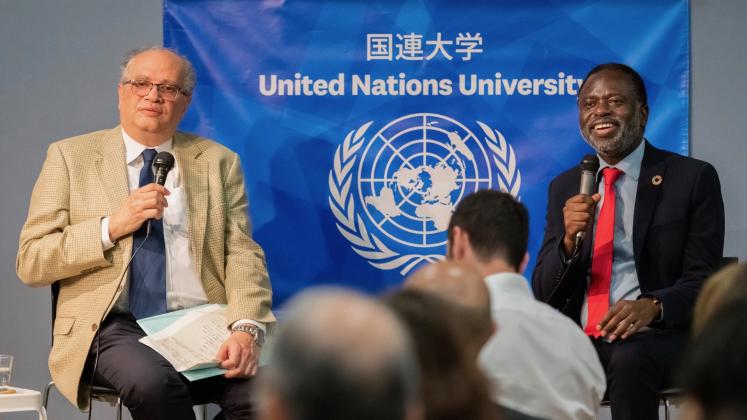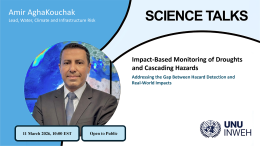On 24 August 2023, UNU-IAS co-organised a conversation event featuring Youssef Nassef, Director of the Adaptation Programme at the United Nations Framework Convention on Climate Change (UNFCCC) Secretariat and UNU Rector Tshilidzi Marwala. Focusing on the theme “Enhancing Global Actions for the Paris Agreement and SDGs — Towards the SDGs Summit, COP28, and Beyond”, the event was part of the UNU Conversation Series, a platform for international experts to share insights on contemporary global affairs.
Dr. Nassef introduced the legal framework for climate action, including UNFCCC, the Kyoto Protocol and the Paris Agreement, and underlined the importance of scientific evidence for their implementation. Discussing expectations for the upcoming UN Climate Change Conference (UNFCCC COP28), he highlighted the first Global Stocktake, a comprehensive assessment of collective progress towards achieving the goals of the Paris Agreement. The global goal on adaptation will also be defined at the conference, clarifying what countries should do preemptively in terms of planned adaptation, and reactively in connection with insurance mechanisms, land relocations, and social protection.
Calling for a mindset shift, Dr. Nassef argued that individuals should align their economic and political decisions to benefit future generations. Incentives are needed to ensure that technology evolves in a way that promotes sustainability.
Advising on how to pursue a career in climate change, he recommended focusing on awareness-raising — although climate change is a global crisis, it is also a stimulus to rethink our assumptions on how the world works.
During discussion with the audience, Dr. Nassef addressed how to operationalise the loss and damage fund, and the need to create a well-resourced and science-based repository of information on climate change. He encouraged young people to change the narrative and become climate action leaders.
In closing, Dr. Nassef emphasised that we need to move away from a simplistic problem–solution mindset, and expand our thinking beyond climate change to pursue a sustainable, equitable, and prosperous future for people and our planet.





